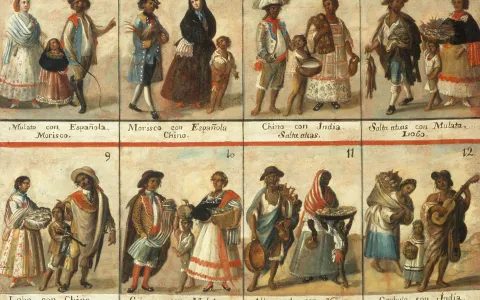Génesis Valenzuela
An experimental short film that relates the murder of Lucrecia Pérez in 1992 - the first case to be recognised as racist and xenophobic by the Spanish authorities - to the racial colonial system imposed in America 500 years earlier, following the arrival of Columbus.
SYNOPSIS
Ana manages to reach Spain and, twenty-nine years after the event, embarks on an investigation into the murder of Lucrecia Pérez, her mother. Declared by the country’s authorities as the first racist and xenophobic murder. Ana searches through newspapers of the time, walks the streets that witnessed the tragedy, interviews the judge who heard the case, the only murderer actually sent to prison, and other witnesses. She also follows the trail of the murderers who escaped justice, but is unable to track them down. Her search leads her all the way back to the origins of racial conflict, when, in 1492, the Spanish conquered a small island they named Hispaniola, the same island Lucretia came from.
As well as such strategies as fiction, documentary and arthouse cinema, the film will use archival materials, both some produced during the colonial period that have been preserved in various historical centres, and other more recent ones relating to the murder of Lucrecia Pérez, as well as other important events that happened during that same year. In 1992, Spain was enjoying a moment of splendour. The Olympic Games took place, the Expo was held in Seville, and the fifth centenary of Columbus’ arrival in America was commemorated. The film’s narrative will related these periods to one another by means of elliptical editing and the character’s voice-over. On the other hand, the film will also include the journey that led the murderers from the Plaza de los Cubos to the neighbourhood of Aravaca, where Lucrecia lived for three months before being murdered. These recordings of the urban landscape will confer a greater impression of veracity on the whole. Interviews with people involved in the case will add another dimension of reality. One such interview will feature Kenia Carvajal Pérez, the real daughter of Lucrecia Pérez, who currently lives in Madrid.
The essential part of the desire to make this film is to think of a relevant cinematographic language with which to develop the ideas described above: Is it possible to develop visual practices/ experiences from a decolonial perspective?
BIO
Génesis Valenzuela (1988. República Dominicana) studied Dramatic Art and took a preparatory course in Plastic Arts at the Nacional Academy of Fine Arts. In 2014 she earned a degree in Advertising. In 2017 she enrolled at the Altos de Chavón Film School in the Directing course. While there she made a short animated film entitled Industrialised which became the official selection for the International Festival of New Latin American Cinema in Havana in 2018, in the Animation section. The same short film was shown in the Animazine section of the 2019 Malaga Festival. At the same school, she created Desideria, a short documentary-essay which premiered at the Doc Buenos Aires International Film Festival and was screened at the Ibero-American Short Film Festival, part of the Quito International Film Festival.. In 2020 she completed her master's degree in Experimental Cinema at the Elías Querejeta School in San Sebastián, Spain where she also put the finishing touches to the text for her first full-length film, Mountain and Snake. With that same script she won first prize in the Writing section of the Nacional Film Competition run by the Dominican Republic's Directorate General of Cinema (FONPROCINE).
The image that appears here is a caste painting produced in the Middle Ages in colonial America.

